Atlas Shrugged Read online
Page 2
To the Professor-his conscience. The reproach and reminder. The ghost that haunts him through everything he does, without a moment's peace. The thing that says: "No" to his whole life.
Some notes on the above: Rearden's sister, Stacy, was a minor character later cut from the novel.
"Francisco" was spelled "Francesco" in these early years, while Danneskjold's first name at this point was Ivar, presumably after Ivar Kreuger, the Swedish "match king," who was the real-life model of Bjorn Faulkner in Night of January 16th.
Father Amadeus was Taggart's priest, to whom he confessed his sins. The priest was supposed to be a positive character, honestly devoted to the good but practicing consistently the morality of mercy. Miss Rand dropped him, she told me, when she found that it was impossible to make such a character convincing.
The Professor is Robert Stadler.
This brings me to a final excerpt. Because of her passion for ideas, Miss Rand was often asked whether she was primarily a philosopher or a novelist. In later years, she was impatient with this question, but she gave her own answer, to and for herself, in a note dated May 4, 1946. The broader context was a discussion of the nature of creativity.
I seem to be both a theoretical philosopher and a fiction writer. But it is the last that interests me most; the first is only the means to the last; the absolutely necessary means, but only the means; the fiction story is the end. Without an understanding and statement of the right philosophical principle, I cannot create the right story; but the discovery of the principle interests me only as the discovery of the proper knowledge to be used for my life purpose; and my life purpose is the creation of the kind of world (people and events) that I like--that is, that represents human perfection.
Philosophical knowledge is necessary in order to define human perfection. But I do not care to stop at the definition. I want to use it, to apply it--in my work; (in my personal life, too--but the core, center and purpose of my personal life, of my whole life, is my work).
This is why, I think, the idea of writing a philosophical non-fiction book bored me. In such a book, the purpose would actually be to teach others, to present my idea to them. In a book of fiction the purpose is to create, for myself, the kind of world I want and to live in it while I am creating it; then, as a secondary consequence, to let others enjoy this world, if, and to the extent that, they can.
It may be said that the first purpose of a philosophical book is the clarification or statement of your new knowledge to and for yourself; and then, as a secondary step, the offering of your knowledge to others. But here is the difference, as far as I am concerned: I have to acquire and state to myself the new philosophical knowledge or principle I used in order to write a fiction story as its embodiment and illustration; I do not care to write a story on a theme or thesis of old knowledge, knowledge stated or discovered by someone else, that is, someone else's philosophy (because those philosophies are wrong). To this extent, I am an abstract philosopher (I want to present the perfect man and his perfect life--and I must also discover my own philosophical statement and definition of this perfection).
But when and if I have discovered such new knowledge, I am not interested in stating it in its abstract, general form, that is, as knowledge. I am interested in using it, in applying it--that is, in stating it in the concrete form of men and events, in the form of a fiction story. This last is my final purpose, my end; the philosophical knowledge or discovery is only the means to it. For my purpose, the non-fiction form of abstract knowledge doesn't interest me; the final, applied form of fiction, of story, does. (I state the knowledge to myself, anyway; but I choose the final form of it, the expression, in the completed cycle that leads back to man.)
I wonder to what extent I represent a peculiar phenomenon in this respect. I think I represent the proper integration of a complete human being. Anyway, this should be my lead for the character of John Galt. He, too, is a combination of an abstract philosopher and a practical inventor; the thinker and the man of action together ...
In learning, we draw an abstraction from concrete objects and events. In creating, we make our own concrete objects and events out of the abstraction; we bring the abstraction down and back to its specific meaning, to the concrete; but the abstraction has helped us to make the kind of concrete we want the concrete to be. It has helped us to create--to re-shape the world as we wish it to be for our purposes.
I cannot resist quoting one further paragraph. It comes a few pages later in the same discussion.
Incidentally, as a sideline observation: if creative fiction writing is a process of translating an abstraction into the concrete, there are three possible grades of such writing: translating an old (known) abstraction (theme or thesis) through the medium of old fiction means, (that is, characters, events or situations used before for that same purpose, that same transtation)--this is most of the popular trash; translating an old abstraction through new, original fiction means--this is most of the good literature; creating a new, original abstraction and translating it through new, original means. This, as far as I know, is only me--my kind of fiction writing. May God forgive me (Metaphor!) if this is mistaken conceit! As near as I can now see it, it isn't. (A fourth possibility--translating a new abstraction through old means--is impossible, by definition: if the abstraction is new, there can be no means used by anybody else before to translate it.)
Is her conclusion "mistaken conceit"? It is now forty-five years since she wrote this note, and you are holding Ayn Rand's masterwork in your hands.
You decide.
-Leonard Peikoff
September 1991
PART I
NON-CONTRADICTION
CHAPTER I
THE THEME
"Who is John Galt?"
The light was ebbing, and Eddie Willers could not distinguish the bum's face. The bum had said it simply, without expression. But from the sunset far at the end of the street, yellow glints caught his eyes, and the eyes looked straight at Eddie Willers, mocking and still--as if the question had been addressed to the causeless uneasiness within him.
"Why did you say that?" asked Eddie Willers, his voice tense.
The bum leaned against the side of the doorway; a wedge of broken glass behind him reflected the metal yellow of the sky.
"Why does it bother you?" he asked.
"It doesn't," snapped Eddie Willers.
He reached hastily into his pocket. The bum had stopped him and asked for a dime, then had gone on talking, as if to kill that moment and postpone the problem of the next. Pleas for dimes were so frequent in the streets these days that it was not necessary to listen to explanations, and he had no desire to hear the details of this bum's particular despair.
"Go get your cup of coffee," he said, handing the dime to the shadow that had no face.
"Thank you, sir," said the voice, without interest, and the face leaned forward for a moment. The face was wind-browned, cut by lines of weariness and cynical resignation; the eyes were intelligent.
Eddie Willers walked on, wondering why he always felt it at this time of day, this sense of dread without reason. No, he thought, not dread, there's nothing to fear: just an immense, diffused apprehension, with no source or object. He had become accustomed to the feeling, but he could find no explanation for it; yet the bum had spoken as if he knew that Eddie felt it, as if he thought that one should feel it, and more: as if he knew the reason.
Eddie Willers pulled his shoulders straight, in conscientious self-discipline. He had to stop this, he thought; he was beginning to imagine things. Had he always felt it? He was thirty-two years old. He tried to think back. No, he hadn't; but he could not remember when it had started. The feeling came to him suddenly, at random intervals, and now it was coming more often than ever. It's the twilight, he thought; I hate the twilight.
The clouds and the shafts of skyscrapers against them were turning brown, like an old painting in oil, the color of a fading masterpiece. Long streaks of grim
e ran from under the pinnacles down the slender, soot-eaten walls. High on the side of a tower there was a crack in the shape of a motionless lightning, the length of ten stories. A jagged object cut the sky above the roofs; it was half a spire, still holding the glow of the sunset; the gold leaf had long since peeled off the other half. The glow was red and still, like the reflection of a fire: not an active fire, but a dying one which it is too late to stop.
No, thought Eddie Willers, there was nothing disturbing in the sight of the city. It looked as it had always looked.
He walked on, reminding himself that he was late in returning to the office. He did not like the task which he had to perform on his return, but it had to be done. So he did not attempt to delay it, but made himself walk faster.
He turned a corner. In the narrow space between the dark silhouettes of two buildings, as in the crack of a door, he saw the page of a gigantic calendar suspended in the sky.
It was the calendar that the mayor of New York had erected last year on the top of a building, so that citizens might tell the day of the month as they told the hours of the day, by glancing up at a public tower. A white rectangle hung over the city, imparting the date to the men in the streets below. In the rusty light of this evening's sunset, the rectangle said: September 2.
Eddie Willers looked away. He had never liked the sight of that calendar. It disturbed him, in a manner he could not explain or define. The feeling seemed to blend with his sense of uneasiness; it had the same quality.
He thought suddenly that there was some phrase, a kind of quotation, that expressed what the calendar seemed to suggest. But he could not recall it. He walked, groping for a sentence that hung in his mind as an empty shape. He could neither fill it nor dismiss it. He glanced back. The white rectangle stood above the roofs, saying in immovable finality : September 2.
Eddie Willers shifted his glance down to the street, to a vegetable pushcart at the stoop of a brownstone house. He saw a pile of bright gold carrots and the fresh green of onions. He saw a clean white curtain blowing at an open window. He saw a bus turning a corner, expertly steered. He wondered why he felt reassured--and then, why he felt the sudden, inexplicable wish that these things were not left in the open, unprotected against the empty space above.
When he came to Fifth Avenue, he kept his eyes on the windows of the stores he passed. There was nothing he needed or wished to buy; but he liked to see the display of goods, any goods, objects made by men, to be used by men. He enjoyed the sight of a prosperous street; not more than every fourth one of the stores was out of business, its windows dark and empty.
He did not know why he suddenly thought of the oak tree. Nothing had recalled it. But he thought of it and of his childhood summers on the Taggart estate. He had spent most of his childhood with the Taggart children, and now he worked for them, as his father and grandfather had worked for their father and grandfather.
The great oak tree had stood on a hill over the Hudson, in a lonely spot of the Taggart estate. Eddie Willers, aged seven, liked to come and look at that tree. It had stood there for hundreds of years, and he thought it would always stand there. Its roots clutched the hill like a fist with fingers sunk into the soil, and he thought that if a giant were to seize it by the top, he would not be able to uproot it, but would swing the hill and the whole of the earth with it, like a ball at the end of a string. He felt safe in the oak tree's presence; it was a thing that nothing could change or threaten; it was his greatest symbol of strength.
One night, lightning struck the oak tree. Eddie saw it the next morning. It lay broken in half, and he looked into its trunk as into the mouth of a black tunnel. The trunk was only an empty shell; its heart had rotted away long ago; there was nothing inside--just a thin gray dust that was being dispersed by the whim of the faintest wind. The living power had gone, and the shape it left had not been able to stand without it.
Years later, he heard it said that children should be protected from shock, from their first knowledge of death, pain or fear. But these had never scarred him; his shock came when he stood very quietly, looking into the black hole of the trunk. It was an immense betrayal--the more terrible because he could not grasp what it was that had been betrayed. It was not himself, he knew, nor his trust; it was something else. He stood there for a while, making no sound, then he walked back to the house. He never spoke about it to anyone, then or since.
Eddie Willers shook his head, as the screech of a rusty mechanism changing a traffic light stopped him on the edge of a curb. He felt anger at himself. There was no reason that he had to remember the oak tree tonight. It meant nothing to him any longer, only a faint tinge of sadness--and somewhere within him, a drop of pain moving briefly and vanishing, like a raindrop on the glass of a window, its course in the shape of a question mark.
He wanted no sadness attached to his childhood; he loved its memories: any day of it he remembered now seemed flooded by a still, brilliant sunlight. It seemed to him as if a few rays from it reached into his present: not rays, more like pinpoint spotlights that gave an occasional moment's glitter to his job, to his lonely apartment, to the quiet, scrupulous progression of his existence.
He thought of a summer day when he was ten years old. That day. in a clearing of the woods, the one precious companion of his childhood told him what they would do when they grew up. The words were harsh and glowing, like the sunlight. He listened in admiration and in wonder. When he was asked what he would want to do, he answered at once, "Whatever is right," and added, "You ought to do something great . . . I mean, the two of us together." "What?" she asked. He said, "I don't know. That's what we ought to find out. Not just what you said. Not just business and earning a living. Things like winning battles, or saving people out of fires, or climbing mountains." "What for?" she asked. He said, "The minister said last Sunday that we must always reach for the best within us. What do you suppose is the best within us?" "I don't know." "We'll have to find out." She did not answer; she was looking away, up the railroad track.
Eddie Willers smiled. He had said, "Whatever is right," twenty-two years ago. He had kept that statement unchallenged ever since; the other questions had faded in his mind; he had been too busy to ask them. But he still thought it self-evident that one had to do what was right; he had never learned how people could want to do otherwise; he had learned only that they did. It still seemed simple and incomprehensible to him: simple that things should be right, and incomprehensible that they weren't. He knew that they weren't. He thought of that, as he turned a corner and came to the great building of Taggart Transcontinental.
The building stood over the street as its tallest and proudest structure. Eddie Willers always smiled at his first sight of it. Its long bands of windows were unbroken, in contrast to those of its neighbors. Its rising lines cut the sky, with no crumbling corners or worn edges. It seemed to stand above the years, untouched. It would always stand there, thought Eddie Willers.
Whenever he entered the Taggart Building, he felt relief and a sense of security. This was a place of competence and power. The floors of its hallways were mirrors made of marble. The frosted rectangles of its electric fixtures were chips of solid light. Behind sheets of glass, rows of girls sat at typewriters, the clicking of their keys like the sound of speeding train wheels. And like an answering echo, a faint shudder went through the walls at times, rising from under the building, from the tunnels of the great terminal where trains started out to cross a continent and stopped after crossing it again, as they had started and stopped for generation after generation. Taggart Transcontinental, thought Eddie Willers, From Ocean to Ocean--the proud slogan of his childhood, so much more shining and holy than any commandment of the Bible. From Ocean to Ocean, forever--thought Eddie Willers, in the manner of a rededication, as he walked through the spotless halls into the heart of the building, into the office of James Taggart, President of Taggart Transcontinental.
James Taggart sat at his desk. He looked like a man approac
hing fifty, who had crossed into age from adolescence, without the intermediate stage of youth. He had a small, petulant mouth, and thin hair clinging to a bald forehead. His posture had a limp, decentralized sloppiness, as if in defiance of his tall, slender body, a body with an elegance of line intended for the confident poise of an aristocrat, but transformed into the gawkiness of a lout. The flesh of his face was pale and soft. His eyes were pale and veiled, with a glance that moved slowly, never quite stopping, gliding off and past things in eternal resentment of their existence. He looked obstinate and drained. He was thirty-nine years old.
He lifted his head with irritation, at the sound of the opening door.
"Don't bother me, don't bother me, don't bother me," said James Taggart.
Eddie Willers walked toward the desk.
"It's important, Jim," he said, not raising his voice.
"All right, all right, what is it?"
Eddie Willers looked at a map on the wall of the office. The map's colors had faded under the glass--he wondered dimly how many Taggart presidents had sat before it and for how many years. The Taggart Transcontinental Railroad, the network of red lines slashing the faded body of the country from New York to San Francisco, looked like a system of blood vessels. It looked as if once, long ago, the blood had shot down the main artery and, under the pressure of its own overabun dance, had branched out at random points, running all over the country. One red streak twisted its way from Cheyenne, Wyoming, down to El Paso, Texas--the Rio Norte Line of Taggart Transcontinental. New tracing had been added recently and the red streak had been extended south beyond El Paso--but Eddie Willers turned away hastily when his eyes reached that point.
He looked at James Taggart and said, "It's the Rio Norte Line." He noticed Taggart's glance moving down to a corner of the desk. "We've had another wreck."
"Railroad accidents happen every day. Did you have to bother me about that?"
"You know what I'm saying, Jim. The Rio Norte is done for. That track is shot. Down the whole line."

 Anthem
Anthem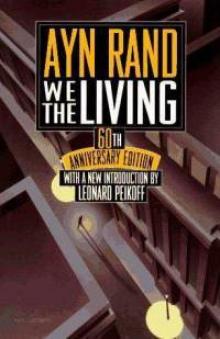 We the Living
We the Living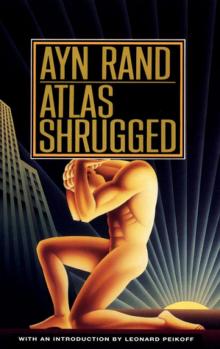 Atlas Shrugged
Atlas Shrugged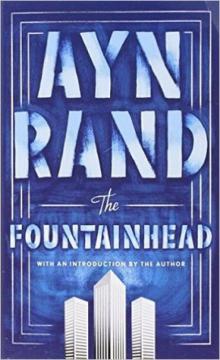 The Fountainhead
The Fountainhead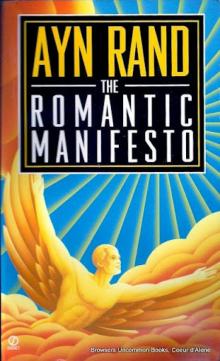 The Romantic Manifesto: A Philosophy of Literature
The Romantic Manifesto: A Philosophy of Literature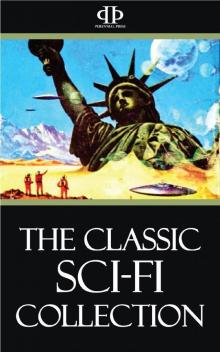 The Classic Sci-Fi Collection
The Classic Sci-Fi Collection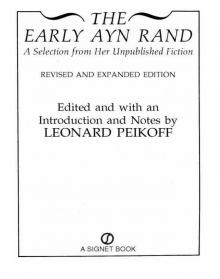 The Early Ayn Rand
The Early Ayn Rand